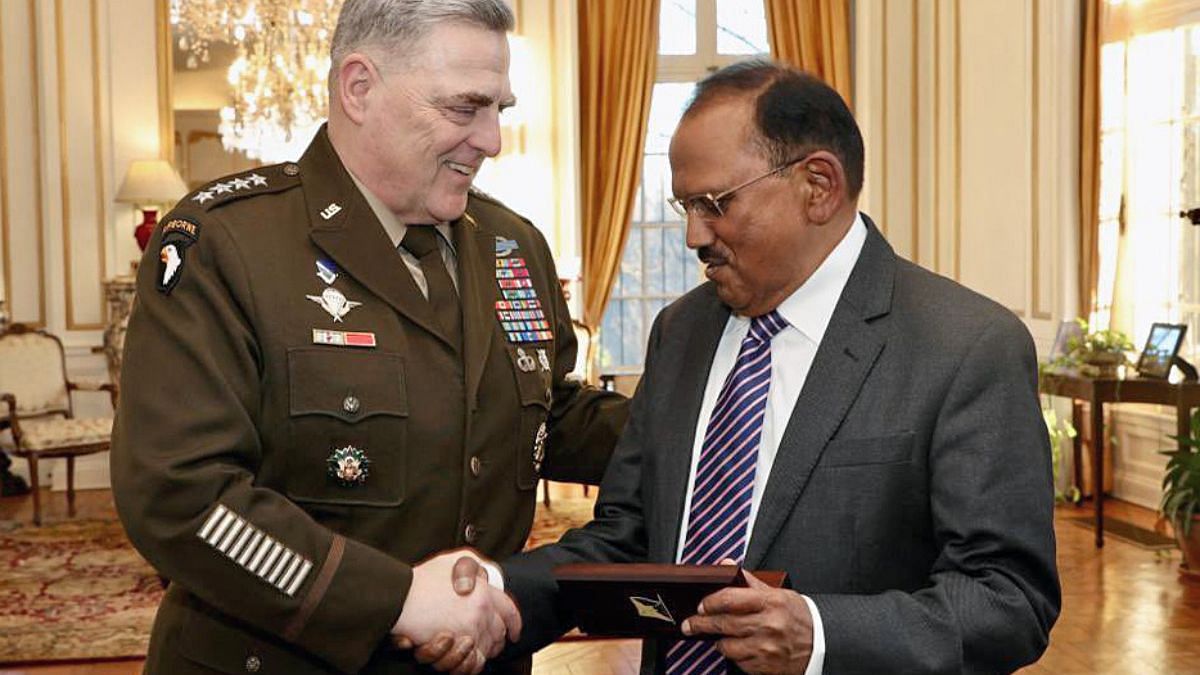

US Army General Mark Alexander Milley, the 20th Chairman of Joint Chiefs of Staff, will ‘hang up his uniform’ on 30 September after an illustrious, albeit controversial, career spanning 43 years. His military career was blemished by the chaotic withdrawal of the US Army from Afghanistan in 2021, which happened against his advice. However, he cut a niche for himself as the upholder of the constitution, military values, and ethics during the first 16 months of his tenure under former President Donald Trump, who had a marked tendency to flout the same.
Like India, the US has a much longer unbroken record of the supremacy of the civil government over the military since its independence. The armed forces uphold the constitution, but are accountable to the nation under the control of the elected president and the legislature—a relationship maintained by robust institutions. The military gives considered advice and the government makes the decisions. So long as the government’s command is lawful, the armed forces are duty-bound to obey. However, under Trump, this relationship came under tremendous strain. In India, too, this relationship is straying away from the well-established norms due to political exploitation of the military by the Narendra Modi government.
Trump’s tumultuous relationship with the military, wherein he demanded personal and political loyalty by flouting the constitution, and Milley’s steadfastness to uphold it, has been recorded in a series of articles in US media. Notable among these is the long article in The Atlantic titled ‘The Patriot’, written by the publication’s editor-in-chief, Jeffrey Goldberg. Earlier, this was covered in detail in the book The Divider: Trump in the White House, 2017-2021 by Peter Baker of The New York Times and Susan Glasser of The New Yorker.
Constitutional vs political loyalty
Like all strong right-wing leaders, Trump had a fascination with the military. He flooded his administration with retired generals and referred to the serving ones as “my generals.” He expected the military to be an extension of his politics and demanded unquestioned obedience and loyalty in the mould of Hitler and his generals. His fascist tendencies were also evident in his penchant for military spectacles.
Much to his chagrin, Trump discovered that the values of the US military were enshrined in the constitution. Soon, his relationship with the generals soured, most of whom were summarily sacked. After initial dithering, the serving generals led by Milley carried out a course correction by upholding the constitution,and refused to be part of Trump’s political machinations.
General on a white horse
Milley was the chosen one, personally selected by Trump overriding the advice of his secretary of defence, former General James Mattis. Apart from his outstanding track record, what endeared Milley to Trump were his never-ending one-liners during earlier meetings as the Chief of the Army Staff—“Mr President, our Army is here to serve you. Because you’re the Commander-in-Chief.” During the selection interview, after some plain speaking, he had said, “Mr President, you’re going to be making the decisions. All I can guarantee from me is I’m going to give you an honest answer…And you’re going to make the decisions, and as long as they’re legal, I’ll support it.” Trump, in all likelihood, missed the caveat—“as long as they’re legal”. Legality here implies that the orders of the civilian authority have to be as per the constitution and Acts of Congress.
After taking over as the Chairman of Joint Chiefs of Staff on 1 October 2019, Milley was quick to note Trump’s erratic conduct. At his welcome ceremony, Trump made insensitive comments about the presence of war-wounded and disabled army Captain Luis Avila, who had been called to sing “God Bless America”. Within a month, Trump pardoned three soldiers guilty of serious human rights violations against Milley’s advice and later boasted, “I stuck up for three great warriors against the deep state.” Milley was desperately trying to come to terms with impulsive and whimsical conduct of the President, but kept his own consul and never said anything in public.
The first day of June 2020 marked a turning point. In the morning, Milley strongly resisted Trump’s demand to deploy active army troops against ‘Black Lives Matter’ protesters near the White House and advised that the National Guards were adequate. Milley was aghast when Trump shouted at him, “You are all fu…ng losers! Can’t you just shoot them? Just shoot them in the legs or something?” The same day, Milley was duped into joining the entourage accompanying Trump across Lafayette Square in Washington DC for a photo shoot outside the St John’s Church damaged by the protestors. It was too late before the realisation dawned on him; later, he quietly slipped away.
Under severe criticism, Milley drafted his resignation on four counts—politicisation of the military, use of the military to create fear, discrimination against minorities, and ruining the established international order. However, after introspection, he decided to fight from within. On 10 June 2020, he publicly apologised for the photo op with Trump. “I should not have been there. My presence in that moment, and in that environment, created a perception of the military involved in domestic politics,” Milley said.
With presidential elections looming large and Trump’s prediction of rigged elections, Milley drew up a plan, a guide on how to get through the next few months. Prevent Trump from starting an unnecessary war overseas. Ensure that the military was not used in the streets against the American people for the purpose of keeping Trump in power. Maintain the military’s and his own integrity. He also took his fellow chiefs into confidence and asserted that the military would play no part in Trump’s attempts to illegally remain in office.
In the weeks before the election, Milley spoke to allies and adversaries alike to quell rumours about the political stability of the United States. He was moving like a dervish. On 30 October, in probably his most controversial decision, he spoke to his Chinese counterpart, former General Li Zuocheng of the People’s Liberation Army, after receiving intelligence that China believed Trump was going to order an attack. “General Li, I want to assure you that the American government is stable and everything is going to be okay. We are not going to attack or conduct any kinetic operations against you.” Milley later told the Senate Armed Services Committee that this call, and another one two days after the 6 January attack on the United States Capitol, represented an attempt to “deconflict military actions, manage crisis, and prevent war between great powers that are armed with the world’s most deadliest weapons.”
On 10 November, seven days after the election, he said in his Veteran’s Day speech that the motto of the United States Army for over 200 years, since 14 June 1775, has been to defend the constitution. “We are unique among armies, we are unique among militaries. We do not take an oath to a king or queen, or tyrant or dictator, we do not take an oath to an individual. No, we do not take an oath to a country, a tribe or a religion. We take an oath to the Constitution, and …… every sailor, airman, marine, coastguard each of us protects and defends that document, regardless of personal price.” His statement was a veiled message for Trump to forestall him from ‘using’ the military in any form while challenging the electoral verdict.
Six days after the violent attack on 6 January, the eight members of the Joint Chiefs of Staff set all rumours at rest. In an unprecedented move, they signed a short memorandum for the armed forces. In brief, the memo stated, “We witnessed actions inside the Capitol building that were inconsistent with the rule of law…Any act to disrupt the Constitutional process is not only against our traditions, values, and oath; it is against the law. On January 20, 2021, in accordance with the Constitution, confirmed by the states and the courts, and certified by Congress, President-elect Biden will be inaugurated and will become our 46th Commander in Chief. President-elect Joe Biden will be their next commander in chief.” Rest is history.
Also read: Army can’t ask soldiers to do social work on leave. It’s beyond the ‘call of duty’
Role model for militaries
Milley will ‘fade away’ but he has left behind a legacy worthy of emulation. He has given the entire world a lesson on the military’s loyalty to the constitution while remaining under civil government control. Not once did he publicly criticise his president or disregard any order. He was able to temper the president’s impulsive and whimsical conduct with firm advice and a straight spine.
The relationship between constitutional loyalty and civil control is not formally studied by most armies. Indian military too has no intellectual understanding of the same. Hence, the default norm is to adhere to political directions treating them like military orders without questioning their constitutional propriety. The only other reason is, weakness of character in generals. Woe betides the nation that is saddled with a military hierarchy suffering from both maladies.
Lt Gen H S Panag PVSM, AVSM (R) served in the Indian Army for 40 years. He was GOC in C Northern Command and Central Command. Post retirement, he was Member of Armed Forces Tribunal. Views are personal.
